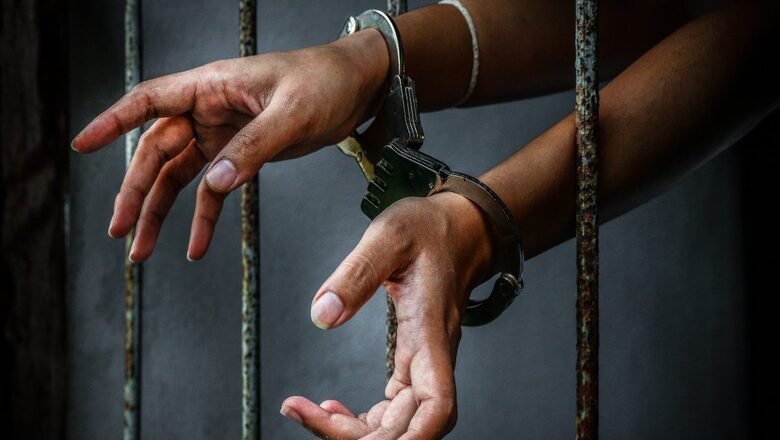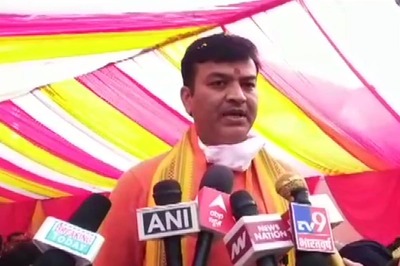
views
Reports have emerged that the National Investigation Agency (NIA) has approached the Ministry of Home Affairs (MHA) to transfer 10-12 gangsters currently lodged in Delhi, Punjab, and Haryana jails, who are suspected to be running their crime syndicates from behind bars, to the Andaman and Nicobar Islands. The list includes Lawrence Bishnoi, a prime accused in the murder of Punjabi singer Sidhu Moosewala.
Moving the prisoners to Andaman and Nicobar Islands does sound familiar to us when we think of our colonial past. Britishers kept some fierce revolutionaries in the jails of Andaman and Nicobar Islands and the case of Veer Savarkar at the Cellular Jail and the atrocities on him are quite familiar to us.
In modern times, moving the gangsters involved in killings to Andaman and Nicobar Islands, a Union territory (UT), has raised questions about the Indian prison system. Aren’t Indian states with a large number of police personnel capable of managing the convicts inside the jails even after 75 years of independence? It is worrisome for the judiciary, civil society groups and the states that such a situation has arrived when the security agencies of the country are thinking of shifting the criminals to the UT.
To know how the prison system works in India, we need to understand it from the basic level. Prison establishment in India exists at three levels — taluka level, district level and central level. In the Indian federal system, prisons and their administration is a state subject covered by item 4 under the state list in the seventh schedule of the constitution of India. But the reports about violence inside the prisons, and criminals running gangs from behind bars are not surprising anymore as it has become the new normal for people to read and watch such reports. These certainly raise a big question on the potency of the state governments where such deeds are seemingly common. The fact that prisoners are able to access 5G phones within the confines of a prison speaks to the existence of deep-rooted corruption and systemic deficiencies. It is alarming that convicts use cutting-edge technology, which not only creates security issues but also raises concerns about the degree of control maintained by prison authorities. The fact that inmates having access to 5G phones continue their criminal behaviour from inside the jail, including planning unlawful actions, calls into question the purpose of incarceration.
Concentrating on technology improvements within Indian jails is essential to addressing these issues and enacting the required reforms. To stop illicit items, such as mobile phones, from entering jails, thorough security measures are first and foremost required. To do this, entrance points must be made more secure, cutting-edge scanning technology must be used, and frequent, comprehensive searches of both visitors and prison personnel must be conducted.
Recently a popular web series titled ‘Criminal Justice’ (the storyline revolves around the prison system), streaming on DisneyPlus Hotstar, had a dialogue, where the protagonist and the main criminal lead were having a conversation and the latter reminds the former that “the world inside the prison is different from the one you came.” The dialogue aptly describes the problems across the jails in India which make the prison reforms of utmost importance — overcrowding, inhumane living conditions, human rights violations, hundreds of prisoners using a single washroom, inadequate rehabilitation and reintegration with society and systematic corruption in favour of few influential individuals.
Prisons across the country are operating at alarmingly high capacities, far exceeding their intended limits. This overcrowding exacerbates various problems, including compromised hygiene, limited access to healthcare, and increased violence within the prison walls. In such an environment, the potential for rehabilitation is diminished, and the risk of recidivism becomes higher. To correct this, an urgent action of overhaul restructuring of the prison system is certainly required. Constructing new prisons, expanding existing facilities, or exploring alternative sentencing options like community service for non-violent offenders are some of the possible options to explore.
The Indian Constitution protects the essential rights of all people, even those who are imprisoned. But inmates frequently endure degrading treatment, torture, and abuse in Indian jails, where human rights breaches are pervasive. Frequently, we hear about fatalities while in custody, excessive force used by prison guards, and difficulty getting legal representation. Strict protocol implementation, improved personnel training, and the creation of independent monitoring organisations can aid in preventing and addressing such infractions.
Any prison system that wants to prepare offenders for a successful release into society must have rehabilitation and reintegration at its centre. In Indian jails, rehabilitation is currently in a terrible situation. Prisoners are ill-prepared to reintegrate into society due to inadequate vocational training, academic offerings, and psychological care, which creates a cycle of reoffending. To give prisoners an opportunity to start afresh and make a good contribution to society after they are released, it is crucial to concentrate on comprehensive rehabilitation programmes, offer skill development, educational opportunities, and mental healthcare.
The recent killings of mafia dons and gangsters in Uttar Pradesh, particularly in police custody, have raised serious concerns about human rights violations and extra-judicial killings. The killings of Vikas Dubey, Atiq Ahmed and his brother, the recent Sanjeev Jeeva case which happened in Lucknow court and others have sparked outrage and criticism from several quarters. The public now views the process with scepticism and mistrust due to the lack of openness and accountability. It is thus necessary to uphold the rule of law.
The task of overhauling prison reforms and accountability in India requires a collaborative effort from various stakeholders. The judiciary, government, media, and civil society play indispensable roles in effecting meaningful change in the prison system. By guaranteeing justice and accountability, the court is a key player in prison reform. To address abuses of human rights, overcrowding, and other urgent problems, it can take action through public interest litigations, prison inspections, and the issuance of directives. The judiciary may safeguard the rights of detainees and push for systemic changes with the help of other stakeholders by actively monitoring the execution of reforms and offering appropriate direction.
When promoting prison reforms and bringing attention to the difficulties encountered by prisoners, the media is an essential tool. It may hold government officials accountable and highlight the need for immediate jail changes by looking into and reporting on human rights breaches, overcrowding, and inadequate rehabilitation. A responsible media may influence public opinion, deepen awareness of the problems, and enhance pressure for reforms.
Can privatisation of prisons in India bring a positive change?
The privatisation of government assets has been a hotly debated topic in the Indian political discourse since independence. With LPG reforms, private players not only entered the market but also key government sectors like banking, insurance, education etc. The debate around privatisation of prisons gathered momentum recently after the comments of Niti Aayog CEO, Amitabh Kant, on privatising jails. But the criticism of the move from a particular lobby which represents a moribund ideology shows how few groups hinder every positive step. Uniform Civil Code (UCC) and farm bills are glaring examples where the government faced excessive criticism even before the implementation of these reforms.
But what are the positive changes the privatisation of jails can bring in? Let’s have a look.
First and foremost, prison management might become more effective and efficient with private players having the command in their hands. Since private businesses are frequently motivated by financial gain, they have an incentive to enhance resource allocation, simplify processes, and minimise waste. The government may guarantee that private jail operators will be held responsible for their performance by instituting competition and performance-based contracts, which would lead to improved management practices and greater resource utilisation. The Indian jail system has long-standing problems, such as overcrowding and insufficient staff-to-inmate ratios, which this efficiency can help alleviate.
The subject of corrections may also benefit from fresh knowledge and innovation brought forth by privatisation. Private firms with a focus on prison administration offer expertise and understanding in putting current methods and technology into practice that can improve security, surveillance, and inmate rehabilitation. They may launch ground-breaking projects and programmes aimed at lowering recidivism rates, providing inmates with job training, and expanding their access to higher education. The creation of more compassionate and effective methods of detention may result from this infusion of experience, which would ultimately aid in the rehabilitation of criminals into society.
Public-private partnerships (PPPs) in the criminal justice system may become more feasible as a result of privatisation. The government may use the resources and expertise of private companies to enhance the amenities and infrastructure of prisons as a whole. This can entail improving outmoded facilities, healthcare services, and convict housing arrangements. PPPs can also go beyond the confines of the jail and include the creation of post-release support networks like halfway homes and rehab centres, which are essential for a smooth transition back into society. Hence, the privatisation of prisons is one such step towards prison reforms which must be explored for better facilities, infrastructure and to bring a complete change.
The apex court of India in September 2022 expressed concern over the conditions of jails in the country and suggested the idea of building private jails involving big corporates. “In Europe, there is a concept of private jails. Then there is corporate social responsibility. If you give them sufficient inducement, you can have jails built. Because you don’t want the public exchequer to be used for that. There is an alarming number of under-trial prisoners. They will build it and give it to you and claim a deduction under the Income Tax. A new concept will emerge. Then a new concept will evolve, from anticipatory bail to anticipatory jail,” said a bench of Justices K M Joseph and Hrishikesh Roy.
Committees and Suggestions on Prison Reforms
All India Committee on Prison Reforms Report (Mulla Committee)
- Making proper accommodations for items like clothing, hygiene, food, and ventilation can help the state of jails around the nation.
- The personnel at the prison needs to be divided into various cadres and have proper training. To hire jail staff nationwide, it would make sense to create an All-India Service named the Indian Prisons and Correctional Service.
- Regular visits by the public and the media to prisons and other correctional facilities are necessary so that they can learn firsthand about the conditions inside and demonstrate their willingness to collaborate with prison administrators on rehabilitation initiatives.
Recommendations of Law Commission of India in its 268th report
The Commission suggested that persons arrested for crimes carrying sentences of up to seven years in prison be freed after serving one-third of that time and those accused of crimes carrying lengthier sentences be released after serving half of that time. Additionally, it was advised that the magistrates should not issue mechanical remand orders and that the police should avoid making unnecessary arrests.
Justice Amitava Roy Committee Prison reform recommendations (2018)
It suggested that special fast-track courts be established to handle only minor offences that had been outstanding for more than five years. Additionally, those who have been charged with minor crimes and have been granted bail but are unable to secure surety should be freed on a Personal Recognizance (PR) Bond.
The Krishna Iyer Committee on Prison Reforms (1987-88)
Due to their special role in dealing with women and child criminals, it has argued for the recruitment of more women into the police force.
Thus, an overhaul restructuring and accountability is required to bring the much-needed change in the prison system of India. This must be done so that people can have strong faith in the system and the rule of law remain supreme in the country, irrespective of power, money and muscle. The lesser explored options like privatisation and technology upgrades must be given priority rather than shifting the convicts to Andaman and Nicobar Islands, as the authorities can’t shift every other gangster operating from behind bars to the UT. Efforts must be diverted towards bringing groundbreaking changes which will be much more beneficial compared to the current trend of shifting criminals to far-flung places, and it will also lay the foundation of a strong and robust prison system in India.
The author is a lawyer and Co-founder, Virina and Rath Foundation. Views expressed in the above piece are personal and solely that of the author. They do not necessarily reflect News18’s views.




















Comments
0 comment